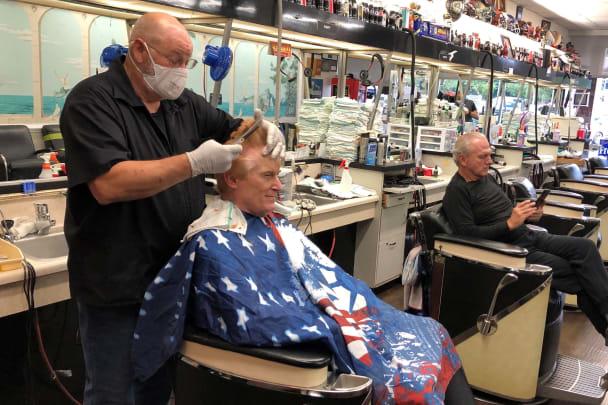Small Businesses In Catch-22 Begin Revolt: ‘Defy State’s Stay-At-Home Order Or Face Collections’
As some states begin hesitantly reopening aspects of their economies, many small business owners find themselves in a Catch-22, as one Atlanta fitness studio operator who says he lost a family member to a likely coronavirus-related illness describes.
“I am in a Catch-22,” Ramese Long – who had only opened his gym in January of this year – lamented, saying “I am anxious to get open. However, rolling the dice medically, I don’t think is a good idea.”
States like Georgia, Colorado, Florida, Texas and a handful of others have stay-at-home orders expiring by end of this month, and have signaled that restrictions will begin to be rapidly lifted. Colorado, Minnesota and Montana are among those planning further to drastically ease social distancing guidelines. And Tennessee plans to go so far as to allow restaurants to welcome diners at 50% capacity starting Wednesday, according to Governor Bill Lee.

But as decision-making regarding freedom to open or close is set to be transferred back to the individual businesses, it’s unclear just how fast things will actually get back to normal.
“For small-business owners, it can come down to life-or-death decisions, for their firm, for their employees and for their customers,” Bloomberg writes. “The tasks at hand are concrete: how to rearrange a restaurant to allow for social distancing and where to buy noncontact infrared thermometers. While many owners are struggling to obtain financial aid and simply get by every day, they wrestle with daunting questions: Is my business model viable at half-capacity and will the customers come back?“
Yet other states, considered to have been more hard-hit by the pandemic such as New York, New Jersey, Oregon and Washington, have yet to suggest any level of a timetable as to when businesses might resume.
Some health officials are advancing models which call for state-wide lockdowns to continue all the way into late June and early July. Researchers behind a University of Washington model that’s now making waves say that no state should open their economies before May 1.

While some sit on the fence in terms of the health risks of welcoming clients and customers – or at least fearing they won’t come back over negative perceptions – others in more restrictive states have taken matters into their own hands.
For example, despite California hair salons and barbershops being ordered closed across the state since March, at least two are making local and national headlines for defying the order:
After more than a month without income, two business owners in Auburn have decided to defy that order and reopen their doors to customers anyway.
For Clip Cage owner Breann Curtis, it was either defy the state’s stay-at-home order or face collections.
“I have to do what I have to do. I’m fighting to provide for my children and myself and my family right now,” explained Curtis.
A local FOX affiliate describes that the hair salons have lost thousands in income as debts are mounting.
They’re forced into a ‘defy or die’ situation, where they’ve out of desperation opted to open while implementing a vigorous sanitization regimen:
“It’s been very hard. I’m pregnant. I have children at home,” said Curtis.
Closing shop in March meant she could no longer work to support her family, missing out on thousands of dollars in lost income.
She’s not the only salon owner who reached their breaking point.
Tisha Fernhoff runs the Beauty Bar Salon in the same Auburn shopping complex and also made the call to open her doors.
“How much longer am I supposed to go down the rabbit hole before I just throw in the towel and go back to work?” Fernhoff told FOX40.
Hair salons and barbershops across the state have been closed since March under the state’s stay-at-home order. https://t.co/4TjKdpfYYx
— FOX40 News (@FOX40) April 23, 2020
They say they were denied applications for the Paycheck Protection Program. Meanwhile it’s unclear whether they’ll suffer legal backlash from local authorities.
In many instances across the US, police have visited local business – especially ones where people come into close contact like hair and nail salons, or gyms and massage parlors – to order them closed.
But as some states reopen, it’ll be all the more temptation for many businesses still in neighboring restricted states to take the early initiative and defy state and local closure orders.
Tyler Durden
Sun, 04/26/2020 – 13:50
via ZeroHedge News https://ift.tt/2KBjpoF Tyler Durden